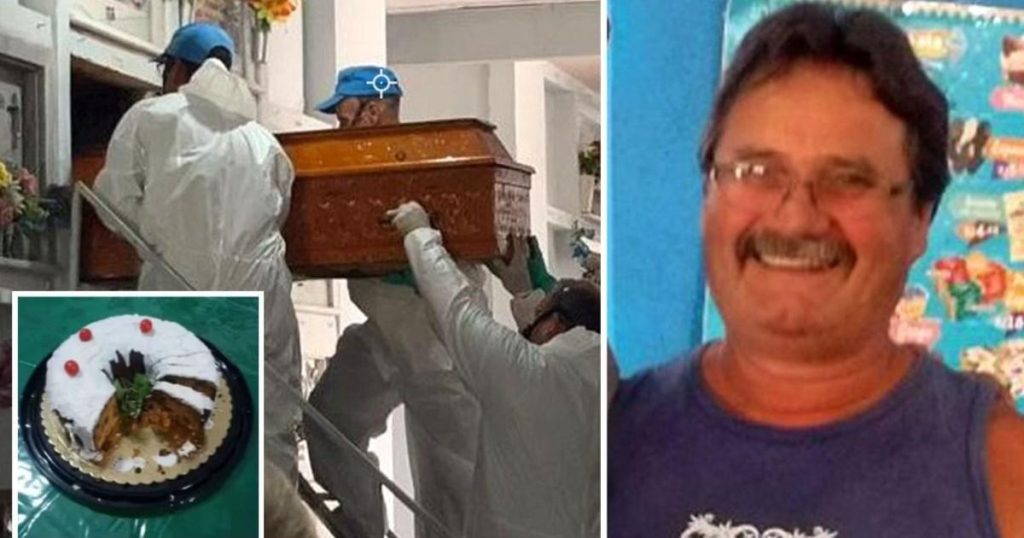The Unveiling of a Sinister Plot: A Christmas Cake Laced with Arsenic and a Family Torn Apart
In the tranquil coastal town of Arroio Do Sal, Brazil, a festive Christmas gathering took a horrifying turn, leaving three family members dead and another critically ill. The idyllic holiday scene was shattered by the presence of a hidden danger – a lethal dose of arsenic concealed within a seemingly innocent Christmas cake. The victims, Tatiana Denize Silva dos Anjos, 43, Maida Berenice Flores da Silva, 58, and her niece Neuza Denize Silva dos Anjos, 65, succumbed to the poison’s insidious effects, leaving their families devastated and a community in shock.
The tragedy deepened with the unsettling discovery of traces of arsenic in the exhumed body of Paolo Luiz, 68, the brother-in-law of two of the deceased women. Paolo had passed away months earlier under suspicious circumstances, having consumed contaminated bananas. Initially, his death was attributed to contaminated food due to recent flooding, but the discovery of arsenic raised serious questions and shifted the focus of the investigation.
As the investigation unfolded, a web of complex family relationships and long-standing tensions came to light. Suspicion fell upon Deise Moura, 42, the daughter-in-law of Zeli Dos Anjos, 61, who survived both the Christmas cake poisoning and her husband Paolo’s earlier demise. The troubled relationship between Zeli and Deise, marked by accusations and animosity, became a focal point for investigators seeking to unravel the motive behind the poisonings.
The arrest of Deise Moura sent shockwaves through the community and ignited a media frenzy. Deise vehemently denied any involvement in the poisonings, maintaining her innocence and questioning the evidence against her. Her legal team challenged the prosecution’s case, highlighting the lack of a direct link between Deise and the arsenic-laced cake. They emphasized the absence of concrete evidence explaining how the poison ended up in Zeli’s home or how it was acquired. Their arguments centered on the need for more substantial proof beyond circumstantial evidence and family testimonies.
The investigation took a further twist with the revelation of incriminating internet searches on Deise Moura’s phone. Investigators discovered searches for "arsenic" and related terms, adding weight to the prosecution’s case. While Deise’s defense team sought to downplay the significance of these searches, the digital trail provided a compelling piece of circumstantial evidence.
The case highlighted the severity of using poison as a weapon in Brazil, where such acts can lead to significantly harsher penalties. Legal experts confirmed that the use of poison could elevate a homicide charge to premeditated murder, potentially adding up to 30 years to a prison sentence. The legal ramifications of the case underscored the gravity of the alleged crime and the potential consequences for the accused.
The tragic events surrounding the arsenic-laced Christmas cake and the subsequent investigation left the community of Arroio Do Sal grappling with grief and unanswered questions. The case became a chilling reminder of the fragility of life and the devastating consequences of hidden malice. As the legal proceedings continued, the families of the victims and the community at large awaited justice and closure, hoping to find answers amidst the tragedy.
The Christmas gathering, intended to be a joyous celebration, transformed into a nightmare, forever etched in the memories of those affected. The seemingly innocent Christmas cake became a symbol of betrayal and a stark reminder that even within the closest of circles, danger can lurk unseen. The investigation, with its complexities and conflicting accounts, challenged the investigators to piece together the puzzle and uncover the truth behind the poisonings.
The exhumation of Paolo Luiz’s body added another layer of mystery to the already complex case. The discovery of arsenic in his system suggested a potential connection between his death and the subsequent poisoning of his relatives. While the exact nature of the link remained unclear, the presence of arsenic raised serious questions about the possibility of a broader pattern of foul play.
The strained relationship between Zeli Dos Anjos and Deise Moura emerged as a central theme in the investigation. The accusations and animosity between the two women painted a picture of a family divided by conflict. While the specific details of their disagreements remained undisclosed, the tense dynamic between them provided a possible motive for the poisonings.
The arrest of Deise Moura sparked intense media scrutiny and public debate. Her vehement denials of guilt clashed with the circumstantial evidence gathered by investigators. The case became a battle of narratives, with the prosecution presenting a picture of a calculated poisoning plot, while the defense emphasized the lack of direct proof linking Deise to the crime.
The discovery of internet searches for arsenic on Deise Moura’s phone provided a significant boost to the prosecution’s case. While the defense argued that the searches were not conclusive proof of guilt, the digital evidence raised further questions about Deise’s potential involvement.
The case highlighted the seriousness with which Brazilian law treats crimes involving poison. The potential for increased penalties in cases involving the use of poison underscored the gravity of the alleged crime and the potential consequences facing Deise Moura if found guilty.
The Christmas cake poisoning case in Arroio Do Sal captivated the nation and sparked international interest. The tragic events, coupled with the complex family dynamics and the ongoing investigation, made headlines around the world. The case served as a chilling reminder of the fragility of life and the devastating consequences of hidden malice.
As the legal proceedings continued, the families of the victims awaited justice and closure. The community of Arroio Do Sal, grappling with grief and unanswered questions, hoped that the truth would eventually be revealed and those responsible would be held accountable. The Christmas cake poisoning case remained a tragic chapter in the town’s history, a stark reminder of the darkness that can lurk beneath the surface of seemingly ordinary lives.
The exhumation of Paolo Luiz’s body added a crucial piece to the puzzle, suggesting a possible link between his death and the subsequent poisonings. The presence of arsenic in his system raised questions about whether he was also a victim of foul play.
The strained relationship between Zeli Dos Anjos and Deise Moura became a focal point of the investigation, providing a potential motive for the crimes. The accusations and animosity between the two women painted a picture of a family torn apart by conflict.
The arrest of Deise Moura and her subsequent denials of guilt fueled public speculation and media attention. The case became a battle of narratives, with both sides presenting their version of events.
The discovery of incriminating internet searches on Deise Moura’s phone provided a significant piece of circumstantial evidence for the prosecution. The digital trail raised further questions about Deise’s potential involvement in the poisonings.
The Christmas cake poisoning case highlighted the severity of crimes involving poison in Brazil, with the potential for harsher penalties in such cases. The legal ramifications of the case underscored the gravity of the alleged crime and the potential consequences facing Deise Moura.




